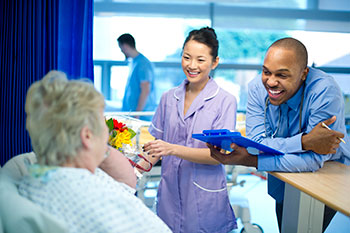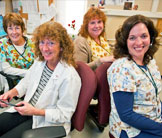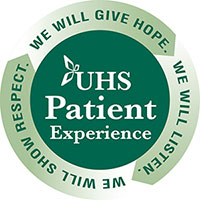
The Patient Experience at UHS
At UHS, quality care and service are the heart and soul of everything we do, and these qualities are the essence of the patient experience.
The patient experience is our identity, our promise.
To understand what a very good patient experience is from our patients’ point of view, we listened to our community to learn what people expected of us as hospitals, nursing homes, home care agencies, physician offices and outreach services. We spoke with ordinary citizens and health care consumers, our friends and neighbors, in terms of quality and service, many of them our current or former patients. We asked a lot of questions, and listened to what they had to say about UHS.
We learned a lot about what they want us to be for them. Our patients want care that is personal rather than impersonal, flexible rather than rigid and user-friendly rather than complicated. They want patient-centered care. Many patients will receive a survey after discharge or after a physician visit. Please take a moment to complete the survey regarding your UHS experience.
A Patient Success"I was recently hospitalized at UHS Wilson Medical Center for a short hospital stay. I would like to thank all of the nurses, nursing assistants & housekeeping staff, who gave me excellent and attentive care...All of the staff involved with my care were very pleasant, professional & kind. I do know how hard they work and, while my case was not complicated, I appreciated very much the great care I received!" - A UHS Patient |
To deliver that high quality patient experience, we are committed to the following positive actions:
We will listen to people. In every interaction with our patients and other customers, we will listen to their questions, concerns, requests, ideas, and their points of view. We will acknowledge their input and let them know we care about them.
We will show them respect. We will be responsive every day to people’s desire for simplicity, communication, compassion and quality. We will respect their privacy, safety and time.
We will give them hope. When people come to us for care, they are often at their most vulnerable. They rely on our knowledge and skill to see them through. They need our understanding and compassion. They are looking to us for solutions, and for the best possible outcome. We are here to fulfill their needs through our skill, our support and the quality care they expect.
UHS Culture of Safety
A partnership between our patients and our staff
In order for UHS to provide you with the highest quality healthcare we all must work together. This means that our medical professionals must work together, and that you have a role as well. When our patients play an active, involved role in their health care, they achieve the best outcomes. When you ask questions and understand your health status, diagnosis and treatment plan, you can help the health care team achieve the kind of good communication that is vital to protect your safety.
See the following suggestions for working with your health care team to achieve a safe, positive patient care experience at UHS. These suggestions apply mostly to the inpatient experience, but some may apply equally to outpatient visits.
Communication
One of the most important things you can do is to speak up and ask questions, especially if you are unclear, unsure or confused. Feel free to ask who people are, what they are doing and where you are going.
You might want to ask a family member or friend to help you ask questions and understand what doctors, nurses and others say to you. Pay attention to your tests, treatments and medications. Speak up if something does not seem right to you. If you have questions or concerns about your care or safety, speak to your nurse or doctor.
When you are ready to go home, make sure you are clear about your written discharge instructions, including medicines and need for a follow-up visit. Don’t worry if you need to ask someone to repeat the instructions. Be certain you are given a phone number to call if you have questions after you go home.
Minimizing Infections
Your nurses, doctors and other healthcare providers - as well as family members and visitors- should wash their hands before they touch you. Feel free to remind them.
Ask family members and friends who have a cold, the flu, or symptoms of an infection (such as fever, rash, cough, sore throat, nausea, vomiting, diarrhea) not to visit.
Isolation precautions are to protect you, other patients, staff and visitors. Gloves, gowns and masks are worn sometimes, depending on the illness. If you don’t understand why you are on precautions, please ask. Remind your visitors that they, too, must follow the precautions listed on the sign outside your room to protect you and them during their visit.
Please get flu and pneumonia vaccines when they are offered.
Patient Medication Safety
Unfortunately, medication errors happen. They happen in hospitals, in pharmacies, and even at home. The more information you have, the better able you are to prevent errors and take care of yourself. Find out all you can about your conditions and the medication(s) you are taking — including over-the-counter medications. What you learn will help protect you.
Your doctors, nurses and pharmacists work hard to keep you healthy, but you are also responsible. Learn what questions to ask. Expect answers...it’s your life and your health!
Remember...medication error prevention is a shared responsibility.
Following are suggestions about how you can help prevent medication errors if you are hospitalized.
•When you come to the hospital, bring a list of the medications, nutritional supplements, vitamins, over-the-counter medications and herbal medications you are taking at home.
•If you bring your medications to the hospital, send them home with your family once the nursing staff has seen them. While you are in the hospital, you may not need the same medications.
•Tell your doctor you want to know the names of the medications you will be receiving while in the hospital and the reason you are taking them. That way, if anyone tells you anything different, you’ll know to ask questions, which might prevent an error.
•Look at all medications before you take them. If it doesn’t look like what you usually take, ask why.
•Do not let anyone give you medications without checking your name band. This helps prevent you from getting someone else’s medications.
•Remind your nurse and doctor if you have allergies.
•When you get ready to go home, have the doctor or nurse go over each medication with you and a family member.
Patient Identification
When you are admitted, you will have a patient identification bracelet placed on your wrist. This bracelet includes your name and medical record number. Remind all caregivers to look at your identification bracelet before giving medication, drawing blood or performing a procedure. Please do not remove this bracelet.
Staff Identification
All hospital employees are required to wear photo identification badges. Be sure all your caregivers have a hospital ID with their picture on it.
Avoiding Treatment Errors
Find out what is planned for you each day so you can ask questions about tests or treatments that seem unusual.
It may be helpful to ask a family member or friend to listen with you when staff explains a diagnosis, treatment, test result or discharge plan
Write down questions you have for physicians about your procedure, treatment and medications.
If you are visiting a family member and notice any unusual level of confusion, talk with the nursing staff about safety options.
Preventing Falls
- Ask for help from the nursing staff if you need to get out of bed or use the bathroom, especially at night.
- Don’t be embarrassed to ask for help. Try to call for help before your need becomes urgent. Keep your call button near you.
- Make sure there is enough light to see, and keep your eyeglasses near you.
- Never climb over bed rails.
- Wear slippers with rubber soles to prevent slipping.
- Let a staff person know about any fluids or objects on the floor that could cause a fall.
Other Safety Tips
- Dentures, hearing aids and glasses are the most commonly lost items in hospitals. Please make sure they are not left on food trays or in bed linens. Remember where you put them.
- Make sure you know how to use your nurse call button and where others are located.
- Your doctor or nurse should approve all food from home and restaurants.
- No one but staff should touch medical equipment.
- Ask staff to explain what the equipment does, and what the alarms mean. Call your nurse if an alarm sounds.




